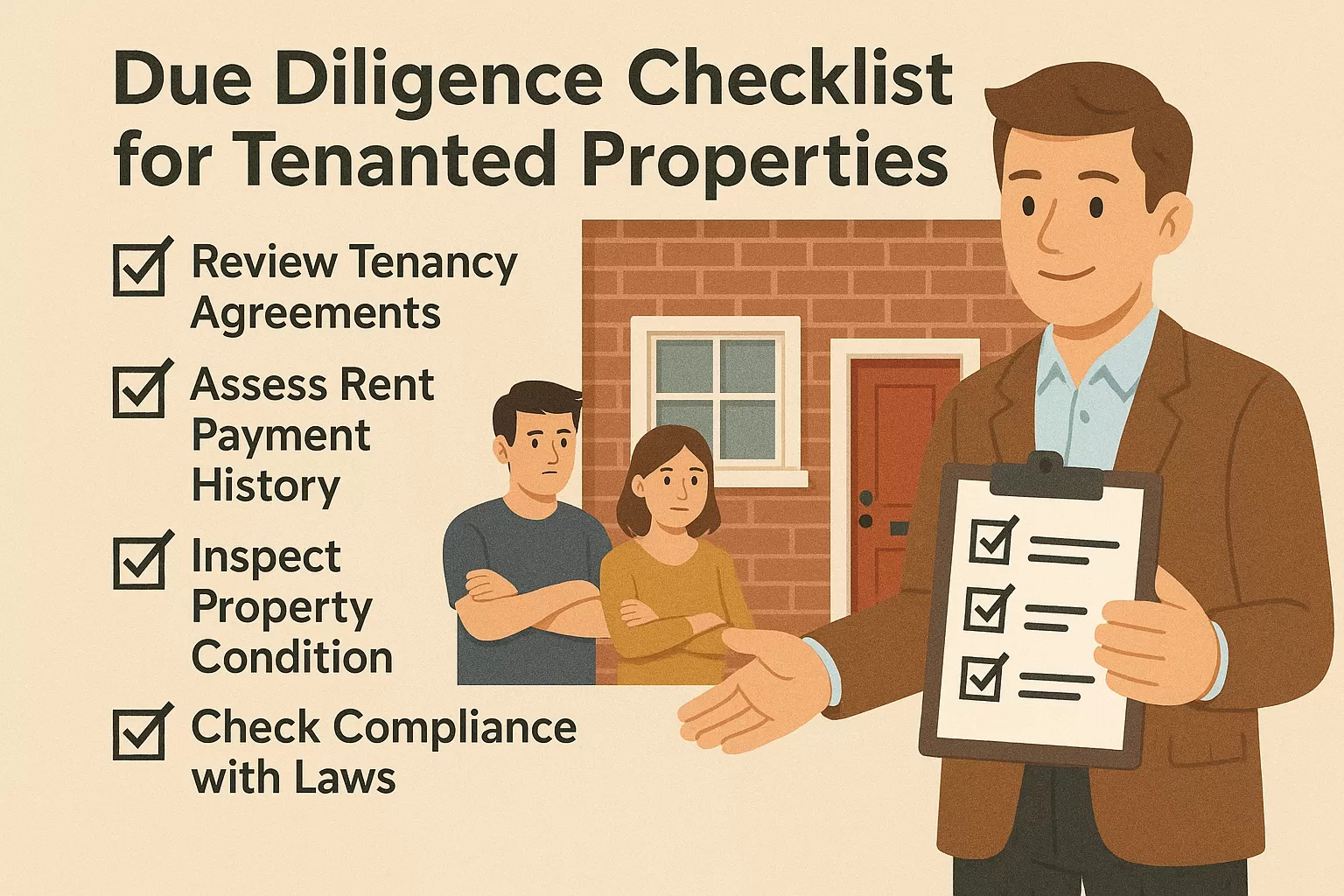Selling a rental property can be challenging under the best circumstances, but the complexity increases significantly when dealing with problem tenants. Whether facing rent arrears, property damage, unauthorized occupants, or simply uncooperative behaviour during sales, landlords must balance their right to sell and tenants’ legal protections. This comprehensive guide explores practical strategies for selling properties with problem tenants, legal considerations, and alternative approaches to simplify this challenging situation.
Identifying Problem Tenant Scenarios
Before developing a strategy, you must identify your specific challenges.
Financial Issues
Tenant financial problems can significantly impact property saleability:
- Rent arrears: Tenants who have fallen behind on payments
- Inconsistent payment history: Erratic or frequently late payments
- Deposit disputes: Disagreements about potential deductions
- Utility payment problems: Unpaid bills or disputed charges
- Service charge arrears: Unpaid contributions to communal costs
Property Care Issues
How tenants maintain the property affects buyer perceptions:
- Property damage: Beyond normal wear and tear
- Cleanliness concerns: Excessive untidiness or hygiene issues
- Unauthorised alterations: Changes made without permission
- Garden/exterior neglect: Poor maintenance of outdoor spaces
- Pest problems: Infestations resulting from tenant behaviour
Behavioural Issues
Tenant conduct can complicate the sales process:
- Access refusal: Preventing viewings despite reasonable notice
- Viewing sabotage: Deliberately making the property unappealing
- Aggressive behaviour: Hostility toward the landlord or potential buyers
- Misleading communications: Providing false information to viewers
- Excessive complaints: Unreasonable or frequent grievances
Occupancy Issues
Unauthorized occupancy situations create legal complications:
- Subletting: Tenants renting to others without permission
- Unauthorised occupants: People living in the property not named on the tenancy
- Abandoned property: Tenants who have left but whose possessions remain
- Business use: Using residential property for commercial purposes
- Overcrowding: Too many occupants for the property size
Legal Considerations When Selling with Problem Tenants
Comprehending the legal framework is essential before taking action.
Tenancy Agreement Review
Start by thoroughly examining the tenancy agreement:
- Fixed-term vs. periodic: Different rules apply depending on the tenancy stage
- Break clauses: Potential early termination options
- Specific conditions: Special terms regarding property sale
- Access provisions: Rights regarding viewings and inspections
- Subletting restrictions: Terms prohibiting unauthorized occupants
Eviction Options and Limitations
Consider the legal routes for regaining possession:
- Section 8 notice: Used when tenants have breached tenancy terms
- Section 21 notice: “No-fault” eviction option for periodic tenancies
- Notice periods: Statutory timeframes that must be observed
- Court proceedings: Process for obtaining possession orders
- Bailiff enforcement: Final stage if tenants refuse to leave
Tenant Rights During Sales
Even problematic tenants retain important legal protections:
- Right to quiet enjoyment: Protection from excessive viewings or harassment
- Proper notice: Requirement for adequate warning before visits
- Privacy considerations: Limitations on photography and marketing
- Deposit protection: Continued compliance with deposit scheme requirements
- Repair obligations: Ongoing landlord responsibilities despite sale plans
Strategic Approaches for Different Scenarios
Rent Arrears Situations
When tenants have fallen behind on payments:
- Payment plan negotiation: Structured arrangements to clear arrears
- Rent reduction incentives: Temporary discounts in exchange for cooperation
- Cash for keys: Financial incentives for voluntary vacation
- Arrears documentation: Clear records for potential investors
- Legal action balance: Weighing enforcement against the sale timeline
Property Damage Concerns
For properties suffering from tenant-caused damage:
- Inspection and documentation: Thorough recording of all issues
- Repair negotiations: Discussions about tenant-funded remediation
- Insurance claims: Potential coverage for certain damages
- Interim solutions: Addressing critical issues while marketing
- Pricing strategy: Adjusting expectations based on condition
Access and Viewing Challenges
When tenants resist or complicate viewings:
- Written viewing agreements: Formal scheduling of acceptable times
- Accompanied viewings: Landlord or agent presence during all visits
- Viewing incentives: Compensation for tenant cooperation
- Virtual tours: Minimizing physical viewings through technology
- Block viewing days: Consolidating viewings to reduce disruption
Unauthorised Occupant Issues
For properties with subletting or unauthorized residents:
- Occupancy Verification: Documenting who lives in the property
- Direct communication: Engaging with all actual occupants
- Legal status clarification: Determining rights of unauthorized occupants
- Disclosure requirements: Transparency with potential buyers
Communication Strategies for Difficult Situations

Effective communication is essential when dealing with problem tenants during a sale.
Setting the Right Tone
How you communicate can significantly impact tenant cooperation:
- Professional formality: Maintaining appropriate distance
- Written communication: Creating a documented record
- Clear expectations: Explicitly stating requirements
- Consequence transparency: Explaining implications of non-cooperation
- Consistent messaging: Avoiding contradictions or confusion
Incentive Structures
Consider offering incentives for cooperation:
- Viewing compensation: Payment for accommodating showings
- Reference guarantees: Promising positive references for cooperation
- Deposit assurances: Clarity on return conditions
- Flexible moving timelines: Accommodating tenant transition needs
- Moving assistance: Help with relocation costs or logistics
Working with Intermediaries
Sometimes third parties can facilitate better outcomes:
- Tenant’s advisors: Engaging with tenant’s legal representatives
- Mediation services: Using neutral third parties to resolve disputes
- Social services: Involving support agencies for vulnerable tenants
- Guarantors: Communicating with rent guarantors about issues
- Property managers: Utilizing professional intermediaries
The Direct Sale Alternative
For landlords facing particularly challenging tenant situations, specialized property buyers offer a compelling alternative to traditional sales:
- Purchase with problem tenants: Ability to buy despite tenant issues
- No viewing requirements: Eliminating the need for tenant cooperation
- As-is purchase: Acceptance of properties in current condition
- Legal complexity management: Experience handling difficult tenancy situations
- Quick completion: Rapid transaction timeline regardless of tenant circumstances
These buyers specialize in acquiring properties with problematic tenancies, often completing purchases in weeks rather than months, regardless of tenant cooperation levels.
Preparing for Sale with Problem Tenants
Despite challenges, proper preparation remains essential.
Documentation Organization
Compile comprehensive records, including:
- Tenancy agreement: Complete with all amendments and addenda
- Correspondence history: All communications regarding problems
- Payment records: Complete history showing any irregularities
- Inspection reports: Evidence of property condition over time
- Complaint documentation: Records of issues and responses
- Legal notices: Copies of any formal notices served
Disclosure Considerations
Determine what must be disclosed to potential property buyers:
- Material facts: Issues that would affect a buyer’s decision
- Ongoing disputes: Active disagreements or legal proceedings
- Property condition: Damage or maintenance concerns
- Financial irregularities: Rent arrears or payment problems
- Legal status: Current stage of any eviction proceedings
Property Presentation Strategy
Develop a plan for presenting the property despite challenges:
- Exterior focus: Emphasizing aspects accessible without tenant cooperation
- Virtual staging: Showing potential rather than current reality
- Comparable examples: Providing images of similar vacant units
- Investment focus: Emphasizing future potential over current condition
- Honest contextualization: Framing issues within investment opportunity narrative
Legal Action vs. Negotiated Solutions
When to Consider Legal Action
Legal proceedings may be appropriate when:
- Serious breaches exist: Clear violations of tenancy terms
- Negotiation has failed: Attempts at resolution have been unsuccessful
- Timeline allows: Sufficient time exists for legal processes
- Cost-benefit analysis: Potential recovery justifies legal expenses
- Strong legal position: Clear evidence supports your case
Negotiated Exit Strategies
Often more practical than legal action:
- Surrender agreements: Formal termination of tenancy by mutual consent
- Financial incentives: Cash for key” arrangements
- Phased departure: Agreed timeline for vacation
- Deposit compromises: Negotiated agreements on deductions
- Reference exchanges: Positive references in return for cooperation
Working with Specialized Buyers
For many landlords with problem tenants, direct sale to specialized buyers offers the most practical solution:
Advantages of the Direct Sale Approach

- Certainty: Elimination of sale fall-through risks
- Speed: Typically 2-4 weeks from initial contact to completion
- Simplicity: Minimal paperwork and procedures
- Tenant relationship preservation: No need for confrontational processes
- Cost efficiency: Avoiding legal fees, extended holding costs, and agent commissions
The Direct Sale Process
Typically follows a straightforward path:
- Initial consultation: Discussion of property and tenant situation
- Preliminary offer: Based on property value and tenancy circumstances
- Limited inspection: Often conducted with minimal tenant involvement
- Formal offer: Firm purchase proposal with clear terms
- Legal process: Streamlined conveyancing focused on quick completion
- Completion: Transfer of ownership while tenants remain in place
Valuation Considerations
Direct buyers typically consider the following:
- Property value: Underlying asset worth without tenant issues
- Tenancy situation: Nature and severity of problems
- Resolution cost: Estimated expense to resolve tenant issues
- Time factors: Projected timeline for achieving vacant possession
- Risk assessment: Uncertainty evaluation in specific circumstances
Conclusion
Selling a rental property with problem tenants presents significant challenges, but viable solutions exist for every situation. Landlords can navigate even the most difficult circumstances by understanding the legal framework, documenting issues thoroughly, communicating effectively, and considering all available options.
Specialized property buyers offer the most practical solution for many landlords, particularly those facing serious tenant issues or requiring quick sales. These buyers purchase properties with problem tenants in place, eliminating the need for lengthy eviction proceedings, complicated viewing arrangements, or uncertain traditional sales processes.
Whether pursuing traditional sales methods or exploring direct sale alternatives, professional legal advice remains essential. The specific circumstances of each problem tenant situation vary significantly, and tailored guidance ensures compliance with all legal needs while protecting your financial interests.








